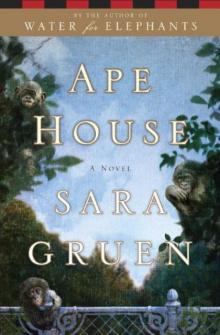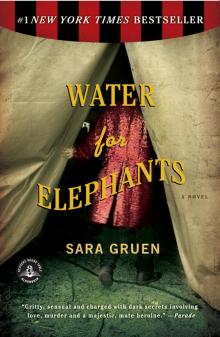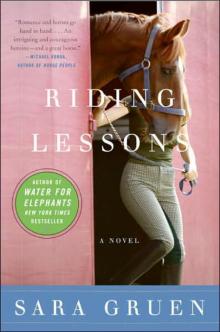- Home
- Sara Gruen
Ape House
Ape House Read online
For great apes everywhere
but especially Panbanisha
Contents
Cover
Title Page
Dedication
Epigraph
Chapter 1
Chapter 2
Chapter 3
Chapter 4
Chapter 5
Chapter 6
Chapter 7
Chapter 8
Chapter 9
Chapter 10
Chapter 11
Chapter 12
Chapter 13
Chapter 14
Chapter 15
Chapter 16
Chapter 17
Chapter 18
Chapter 19
Chapter 20
Chapter 21
Chapter 22
Chapter 23
Chapter 24
Chapter 25
Chapter 26
Chapter 27
Chapter 28
Chapter 29
Chapter 30
Chapter 31
Chapter 32
Chapter 33
Chapter 34
Chapter 35
Chapter 36
Chapter 37
Chapter 38
Chapter 39
Six Months Later
Author's Note
Acknowledgments
About the Author
Discussion Questions for Ape House
Copyright
Give orange give me eat orange me eat orange give me eat orange give me you.
--NIM CHIMPSKY, 1970s
Gimme gimme more, gimme more, gimme gimme more.
--BRITNEY SPEARS, 2007
a cognizant original v5 release october 01 2010
1
The plane had yet to take off, but Osgood, the photographer, was already snoring softly. He was in the center seat, wedged between John Thigpen and a woman in coffee-colored stockings and sensible shoes. He listed heavily toward the latter, who, having already made a great point of lowering the armrest, was progressively becoming one with the wall. Osgood was blissfully unaware. John glanced at him with a pang of envy; their editor at The Philadelphia Inquirer was loath to spring for hotels and had insisted that they complete their visit to the Great Ape Language Lab in a single day. And so, despite seeing in the New Year the night before, John, Cat, and Osgood had all been on the 6 A.M. flight to Kansas City that same morning. John would have loved to close his eyes for a few minutes, even at the risk of accidentally cozying up to Osgood, but he needed to expand his notes while the details were fresh.
John's knees did not fit within his allotted space, so he turned them outward into the aisle. Because Cat was behind him, reclining his seat was not an option. He was well aware of her mood. She had an entire row to herself--an unbelievable stroke of luck--but she had just asked the flight attendant for two gins and a tonic. Apparently having three seats to herself was not enough to offset the trauma of having spent her day poring over linguistics texts when she had been expecting to meet six great apes. Although she'd tried to disguise the symptoms of her cold ahead of time and explain away the residual as allergies, Isabel Duncan, the scientist who had greeted them, sussed her out immediately and banished her to the Linguistics Department. Cat had turned on her legendary charm, which she reserved for only the most dire of circumstances, but Isabel had been like Teflon. Bonobos and humans share 98.7 percent of their DNA, she'd said, which makes them susceptible to the same viruses. She couldn't risk exposing them, particularly as one was pregnant. Besides, the Linguistics Department had fascinating new data on the bonobos' vocalizations. And so a disappointed, sick, and frustrated Cat spent the afternoon at Blake Hall hearing about the dynamic shape and movement of tongues while John and Osgood visited the apes.
"You were behind glass anyway, right?" Cat complained in the taxi afterward. She was crammed between John and Osgood, both of whom kept their heads turned toward their respective windows in a futile attempt to avoid germs. "I don't see how I could have given them anything from behind glass. I would have stood at the back of the room if she'd asked me. Hell, I'd have worn a gas mask." She paused to snort Afrin up both nostrils and then honked mightily into a tissue. "Do you have any idea what I went through today?" she continued. "Their lingo is completely incomprehensible. I was already in trouble at 'discourse.' Next thing I knew it was 'declarative illocutionary point' this, 'deontic modality' that, blah blah blah." She emphasized the "blahs" with her hands, waving the Afrin bottle in one and the crumpled tissue in the other. "I almost lost it on 'rank lexical relation.' Sounds like a smelly, overly chatty uncle, doesn't it? How on earth do they think I'm going to be able to work that into a newspaper piece?"
John and Osgood exchanged a silent, relieved glance when they got their seat assignments for the trip home. John didn't know Osgood's take on today's experience--they hadn't had a moment alone--but for John, something massive had shifted.
He'd had a two-way conversation with great apes. He'd spoken to them in English, and they'd responded using American Sign Language, all the more remarkable because it meant they were competent in two human languages. One of the apes, Bonzi, arguably knew three: she was able to communicate by computer using a specially designed set of lexigrams. John also hadn't realized the complexity of their native tongue--during the visit, the bonobos had clearly demonstrated their ability to vocalize specific information, such as flavors of yogurt and locations of hidden objects, even when unable to see each other. He'd looked into their eyes and recognized without a shadow of a doubt that sentient, intelligent beings were looking back. It was entirely different from peering into a zoo enclosure, and it changed his comprehension of the world in such a profound way he could not yet articulate it.
Being cleared by Isabel Duncan was only the first step in getting inside the apes' living quarters. After Cat's banishment to Blake Hall, Osgood and John were taken into an administrative office to wait while the apes were consulted. John had been told ahead of time that the bonobos had final say over who came into their home, and also that they'd been known to be fickle: over the past two years, they'd allowed in only about half of their would-be visitors. Knowing this, John had stacked his odds as much as possible. He researched the bonobos' tastes online and bought a backpack for each, which he stuffed with favorite foods and toys--bouncy balls, fleece blankets, xylophones, Mr. Potato Heads, snacks, and anything else he thought they might find amusing. Then he emailed Isabel Duncan and asked her to tell the bonobos he was bringing surprises. Despite his efforts, John found that his forehead was beaded with sweat by the time Isabel returned from the consultation and informed him that not only were the apes allowing Osgood and him to come in, they were insisting.
She led them into the observation area, which was separated from the apes by a glass partition. She took the backpacks, disappeared into a hallway, reappeared on the other side of the glass, and handed them to the apes. John and Osgood stood watching as the bonobos unpacked their gifts. John was so close to the partition his nose and forehead were touching it. He'd almost forgotten it was there, so when the M&M's surfaced and Bonzi leapt up to kiss him through the glass, he nearly fell backward.
Although John already knew that the bonobos' preferences varied (for example, he knew Mbongo's favorite food was green onions and that Sam loved pears), he was surprised by how distinct, how differentiated, how almost human, they were: Bonzi, the matriarch and undisputed leader, was calm, assured, and thoughtful, if unnervingly fond of M&M's. Sam, the oldest male, was outgoing and charismatic, and entirely certain of his own magnetism. Jelani, an adolescent male, was an unabashed show-off with boundless energy and a particular love of leaping up walls and then flipping over backward. Makena, the pregnant one, was Jelani's biggest fan, but was also exceedingly fond of
Bonzi and spent long periods grooming her, sitting quietly and picking through her hair, with the result that Bonzi was balder than the others. The infant, Lola, was indescribably cute and also a stitch--John witnessed her yank a blanket out from under Sam's head while he was resting and then come barreling over to Bonzi for protection, signing, BAD SURPRISE! BAD SURPRISE! (According to Isabel, messing with another bonobo's nest was a major transgression, but there was another rule that trumped it: in their mothers' eyes, bonobo babies could do no wrong.) Mbongo, the other adult male, was smaller than Sam and of a more sensitive nature: he opted out of further conversations with John after John unwittingly misinterpreted a game called Monster Chase. Mbongo put on a gorilla mask, which was John's cue to act terrified and let Mbongo chase him. Unfortunately, nobody had told John, who didn't even realize Mbongo was wearing a mask until the ape gave up and pulled it off, at which point John laughed. This was so devastating that Mbongo turned his back and flatly refused to acknowledge John from that point forward. Isabel eventually cheered him up by playing the game properly, but he declined to interact with John for the rest of the visit, which left John feeling as if he'd slapped a baby.
"Excuse me."
John looked up to find a man standing in the aisle, unable to move past John's legs. John shifted sideways and wrangled them into Osgood's space, which elicited a grunt. When the man passed, John returned his legs to the aisle and as he did so caught sight of a woman three rows up holding a book whose familiar cover shot a jolt of adrenaline through him. It was his wife's debut novel, although she had recently forbidden him from using that particular phrase since it was beginning to look as though her debut novel was also going to be her last. Back when The River Wars first came out and John and Amanda were still feeling hopeful, they had coined the phrase "a sighting in the wild" to describe finding some random person in the act of reading it. Until this moment it had been theoretical. John wished Amanda had been the one to experience it. She was in desperate need of cheering up, and he'd very nearly concluded that he was helpless in that department. John checked for the location of the flight attendant. She was in the galley, so he whipped out his cell phone, rose slightly out of his seat, and snapped a picture.
The drinks cart returned; Cat bought more gin, John ordered coffee, and Osgood continued to rumble subterraneously while his human cushion glowered.
John got out his laptop and started a new file:
Similar to chimpanzees in appearance but with slimmer build, longer limbs, flatter brow ridge. Black or dusky gray faces, pink lips. Black hair parted down the center. Expressive eyes and faces. High-pitched and frequent vocalizations. Matriarchal, egalitarian, peaceful. Extremely amorous. Intense female bonding.
Although John had known something of the bonobos' demonstrative nature, he had been initially caught off-guard at the frequency of their sexual contact, particularly between females. A quick genital rub seemed as casual as a handshake. There were predictable occurrences, such as immediately before sharing food, but mostly there was no rhyme or reason that John could ascertain.
John sipped his coffee and considered. What he really needed to do was transcribe the interview with Isabel while he could still recall and annotate the non-aural details: her expressions and gestures, and the moment--unexpected and lovely--when she'd broken into ASL. He plugged his earphones into his voice recorder, and began:
ID: So this is the part where we talk about me?
JT: Yes.
ID: [nervous laugh] Great. Can we talk about someone else instead?
JT: Nope. Sorry.
ID: I was afraid of that.
JT: So what made you get into this type of work?
ID: I was taking a class with Richard Hughes--he's the one who founded the lab--and he talked a little about the work he was doing. I was utterly fascinated.
JT: He passed away recently, didn't he?
ID: Yes. [pause] Pancreatic cancer.
JT: I'm sorry.
ID: Thank you.
JT: So anyway, this class. Was it linguistics? Zoology?
ID: Psychology. Behavioral psychology.
JT: Is that what your degree is in?
ID: My first one. I think originally I thought it might help me understand my family--wait, can you please scratch that?
JT: Scratch what?
ID: That bit about my family. Can you take it out?
JT: Sure. No problem.
ID: [makes gesture of relief] Whew. Thanks. Okay, so basically I was this aimless first-year kid taking a psychology class, and I heard about the ape project and I went, and after I met the apes I couldn't imagine doing anything else with my life. I can't really describe it adequately. I begged and pleaded with Dr. Hughes to be allowed to do something, anything. I would mop floors, clean toilets, do laundry, just to be near them. They just ... [long pause, faraway look] ... I don't know if I can say what it is. It just ... is. I felt very strongly that this was where I belonged.
JT: So he let you.
ID: Not quite. [laughs] He told me that if I took a comprehensive linguistics course over the summer, read all his work, and came back to him fluent in ASL he'd think about it.
JT: And did you?
ID: [seems surprised] Yeah. I did. It was the hardest summer of my life. That's like telling someone to go off and become fluent in Japanese over four months. ASL is not simply signed English--it's a unique language, with a unique syntax. It's usually time-topic-comment-oriented, although like English, there's variability. For instance, you could say [starts signing], "Day-past me eat cherries," or you could say, "Day-past eat cherries me." But that is not to say that ASL doesn't also use the subject-verb-object structure; it simply doesn't use "state-of-being" verbs.
JT: You're losing me.
ID: [laughs] Sorry.
JT: So you came back, you blew him out of the water, and you got the job.
ID: I don't know about blowing him out of the water ...
JT: Tell me about the apes.
ID: What about them?
JT: Seeing you with them today, and then speaking with them myself, and then managing to actually insult one of them--that was an eye-opener.
ID: He got over it.
JT: No. He didn't. But do you understand how strange that whole thing would seem to your average, everyday person? The concept that you can insult an animal in a social situation and have to make it up to him? And possibly fail? That you can have a two-way conversation with apes, in human language no less, and they're doing it simply because they want to?
ID: By Jove, I think he's got it!
JT: I suppose I had that coming.
ID: I'm sorry. But yes, that's the entire point of our work. Apes acquire language through exposure and a desire to communicate, just like human infants, and age-wise there is approximately the same window of opportunity. Although I'd like to branch out a little going forward.
JT: How so?
ID: Bonobos have their own language. You saw that today--Sam told Bonzi exactly where he'd hidden the key, even though they were in separate rooms and couldn't see each other. She went straight for it and never looked anywhere else. We may never be able to use their vocalizations to communicate with them for the same reasons they can't use spoken English--our vocal tracts are shaped too differently, which we think is related to the HAR1 gene sequence, but I think it's high time someone made an attempt to decode it.
JT: About the sex.
ID: What about it?
JT: There's just so much of it. And they're so ... virtuosic. It's clearly not just about procreation.
ID: Absolutely right. Bonobos--along with dolphins and humans--are the only animals known to have recreational sex.
JT: Why do they do that?
ID: Why do you do it?
JT: Uh ... Okay. Moving right along.
ID: I'm sorry. That's a fair question. We believe it's a mechanism to relieve tension, resolve conflict, and reaffirm friendship, although it also has to do with the size of the fem
ales' clitorises and that they are sexually receptive regardless of estrus. Whether this shapes or reflects bonobo culture is a matter of scientific debate, but there are several related factors: food is abundant in their natural habitat, which means the females aren't in competition to feed their babies. They form strong friendships and band together to "correct" aggressive males, thus keeping those genes from entering the pool, and so, unlike chimpanzees, male bonobos do not practice infanticide. Maybe it's because no male has any idea which babies are his, or maybe it's because the males who are allowed to breed don't care and that trait is passed along. Or maybe it's because the females would rip him to shreds. Like I said, it's a matter of some debate.
JT: Do you think the apes know they're apes, or do they think they're human?
ID: They know they're apes, but I don't think it means what you think it does.
JT: Explain.
ID: They know they're bonobos and they know we're human, but it doesn't imply mastery, or superiority, or anything of the sort. We are, all of us, collaborators. We are, in fact, family.
John clicked off his voice recorder and closed the lid of his laptop. He'd have loved to follow up on the family thing, but since she'd backtracked immediately he left it alone. It was also interesting that she'd later called the bonobos her family. Maybe he could coax her into opening up in a follow-up interview. They'd definitely made a connection--a connection that he worried might have crossed over into flirtation at one point, although with each passing mile he felt better about that. She was unquestionably attractive, slim-hipped and athletic with straight blond hair that fell almost to her waist, but her charm was frank and earnest: she wore no makeup or jewelry of any kind, and John doubted she recognized her own appeal. Friendly is what they'd been; maybe she'd eventually trust him with her messy family history. It was the sort of detail readers loved, although this piece already promised to have plenty of those. She'd made another interesting comment when she put on the gorilla mask and gave a proper demonstration of Monster Chase. After she "caught" Mbongo, they'd rolled around on the floor tickling each other and laughing (hers was full and high-pitched, his a nearly silent wheezing, but the expression on his face left no question that it was laughter). John was shocked at the level of roughhousing going on, having been given to believe that working with great apes was extremely dangerous. Even though he'd read that bonobos were different, he hadn't expected her to be so physical with them. His surprise must have been evident, because when she stopped she said, "Over the years, they've become more human, and I've become more bonobo," and in that moment he'd felt a flash of understanding, like he'd been allowed to peek briefly through the crack.

 Ape House
Ape House Water for Elephants
Water for Elephants Riding Lessons
Riding Lessons At the Water's Edge
At the Water's Edge